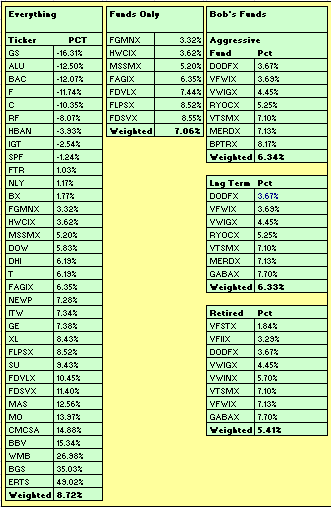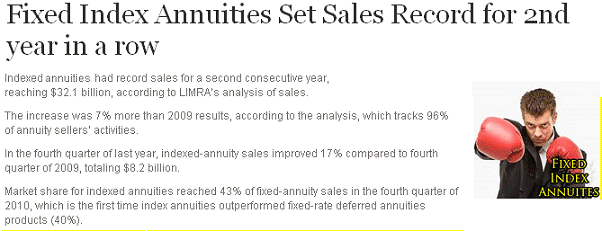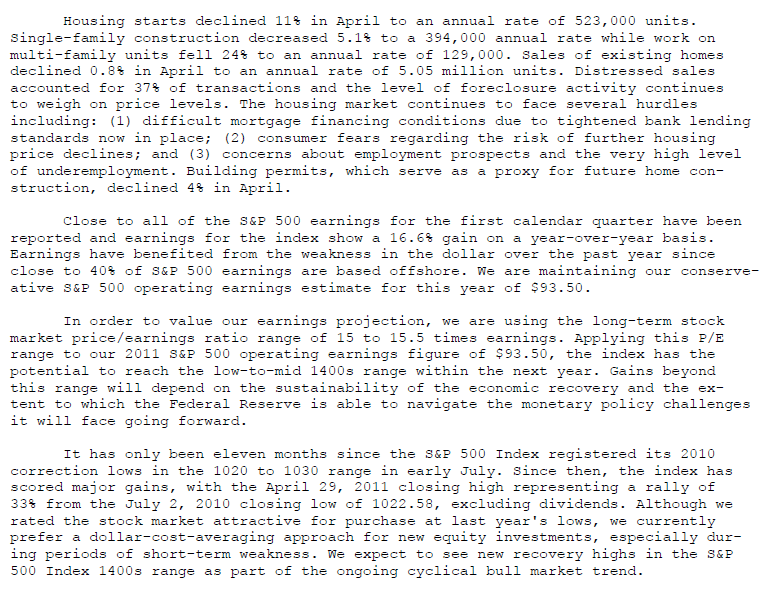Personal
Portfolio

A lot of red this month. Looks to me like a good time to go on an extended vacation.
|

Only in America, Aye?
Selling assets for in return for promise of salvation
strikes me as one of the stupider ways to plan for retirement.
But this is America and you can be as stupid as you like.
Witness electing teleprompters.

|
|
Personal Portfolio (on to more Earthly matters):

I
think it would be beneficial to diversify out a bit into a quality
Canadian company, given the state of the US dollar and the
current government plan to spend us into oblivion.
Potash (POT) fills the bill and it is currently at an attractive price.
This is a long term hold.

MGM
is a more speculative stock but it has significant expansion
overseas. I've traded this one a few times and bought it again
during the pull back. I think I'll hang on to this one a while as
well.
Time to get back into Energy again?

If
you think it's worth sticking your toes in the energy waters
again, PBR is worth a look. It's cheap by PE standards,
pays a dividend and it does move.
I sold my energy
positions a couple months ago because I thought I was looking at a
bubble. The sector did deflate and I think it's worth
picking up a stock or two.
The potential downside is that
this is an ADR, an American Depository Receipt for a foreign stock.
There are added currency and political risks associated with an
ADR.
However, considering what is going on with the joke
we call a government........it might be well worth diversifying
out of the country once more.


Terra Nitrogen is a company that I think looks attractive. Low PE, low volitility, decent yield.
Fixed Index Annuities

For radio listeners such as I, there should be an equivalent to Annoyances.org for venting about radio programming.
There
are probably at least a dozen infomercials currently running, espousing
the great benefits of fixed index annuities and statistics show that
the fear factor, ignorance and slick marketing are sucking
billions of dollars out of US citizens.
They all start out
telling you that the products they sell are guaranteed to never lose
value and go on to say while many suffered significant losses during
2008-2009, none of their clients ever lost a lost a penny.
These
'advisers' continue by cautioning that the investment world is far
too complex and dangerous for an average citizen with a moderately
functioning brain to take part in by himself. He needs an experienced
'adviser' guiding him to financial bliss. Guiding him to an
under performing insurance contract would be a more accurate
description of the services these 'advisers' render.
These
clients who 'never lost a penny', is that really true? If it is
true, it would seem to me I would be giving up something in return for
a guarantee of safety.
The answer is yes and yes.
Insurance
companies don't sell annuities and expect to lose money in the
process. They are in business to make a buck, not to ensure your
financial freedom.
How do they accomplish this and promise at the same time that you will never lose your money?
Fairly Easily.
1. Guarantee you a rate of return which also guarantees the insurance company will return a profit.
An
example might be a bond, where the insurance company buys a bond
yielding 6% with your pooled money. They pay you a guaranteed
3.875% and keep the remaining 2.125% for themselves.
Not a bad deal for the insurance company. Not such a good deal for you, when you could have bought that bond yourself.
2. Lure you in with 'Up Front' Bonuses.
'We'll give your account a 'bonus' of $500.00 if you invest $10,000 with us.'
That
doesn't sound so bad if you don't look at the fine print. If you
do look at the fine print, you will probably find that your guaranteed
3.875% shrunk to 3.75% percent to account for the 'bonus'.
3. The insurance company keeps any dividends.
Yup,
that's right. Say the insurance company chooses to invest your dollars
in the S&P 500 index and quarterly dividend payments come
around. They keep any dividends (which can be substantial) and
pay you the promised 3.875%.
You could have kept your money and your dividends if you chose to invest the money yourself.
4. The Fixed Index annuity pays no compound interest.
Believe
it or not, this is also true. If you invest $10,000 dollars in a
fixed index annuity contract, you are paid interest on the original
$10,000 only.
This means that if you earn $100.00 worth
of interest, that money is for all intents and purposes dead
money. Your account might now be worth $10,100 dollars, but you
are only being paid interest on the original invested amount.
Not a bad deal for the insurance company, but a rather lousy deal for you.
5. The Fixed Index Annuity ties up your money for long periods of time.
That
doesn't sound so bad, after all it is money for retirement.
Suppose however, you live in a tornado prone area and yesterday your
house was reduced to a pile of rubble, your car is now residing under
toppled oak tree, your job is gone because the business is
gone........what do you do?
or........
Suppose
you think you are going to get raptured up and need cash to buy rapture
billboards and signs for park benches. You also need
rapture insurance, guaranteeing care for your pets should you get
whisked up into outer space.
If you're a little light on emergency cash but you do have money in annuities, you can tap into that piggy bank, right?
Sure.
But,
if that money is still under the contractual agreement of an
annuity, you can pay big $$ in surrender fees to the insurance
company to get access to the cash because you are in effect breaking a
contract.
Worse than that would be raiding an annuity inside a
retirement account and if you are not yet 59 1/2, Uncle Sam is just
going to love you for the substantial contribution you made to the IRS.
I
would say those are five major reasons not to purchase fixed index
annuities. Throw in proven sub-par performance and higher costs in comparison to
investing in conventional investment vehicles, is that guarantee of
safety all it's cracked up to be?
I think not.
What Else.......
Here's the portfolio allocations:
| Sector |
Apr |
May |
June |
| Banks: |
18.98% |
17.97% |
17.02% |
| Investing Co's |
2.71% |
2.73% |
2.78% |
| Telecom / Inet |
12.37% |
12.36% |
10.22% |
| Manufacturing |
12.61% |
12.78% |
12.15% |
| Food / Sin |
10.31% |
8.42% |
9.01% |
| Insurance |
6.10% |
5.92% |
5.91% |
| Real Estate |
5.42% |
5.44% |
5.93% |
| Tech |
4.60% |
7.24% |
6.81% |
| MF -
G&I |
7.23% |
7.15% |
7.44% |
| MF - Value |
7.18% |
7.56% |
6.51% |
| MF - Small Cap |
4.51% |
4.94% |
3.93% |
| MF-Large Cap |
4.36% |
4.38% |
4.38% |
| Other |
@ 4% |
@3% |
@8% |
I took a large chunk of BGS foods off the table - impressive profits there, and moved more to tech.
Banks are clearly the drag but I'm holding pat on what I have.

How does that saying go?
"Fool me once, shame on you. Fool me twice, shame on .....who?"
"Fool me three times, I might as well shoot myself because I'm a complete idiot."

Bad Hair Day?
| |




